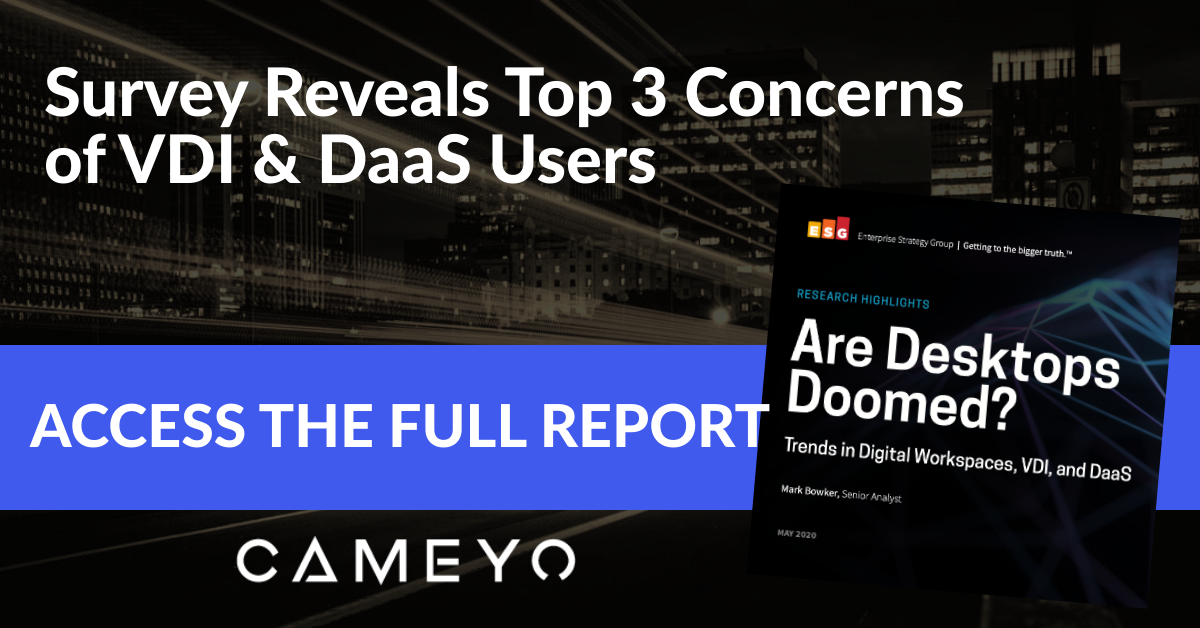A new report by Enterprise Research Group (ESG) reveals that even though 4 out of 10 organizations are currently using virtual desktop infrastructure (VDI) or Desktop as a Service (DaaS) products to enable remote work, the top challenges those organizations experience with those products are cost, complexity, and security. You can download the full version of the report for free here.
Over the past 3 months, many IT organizations were put in a situation where they needed to quickly deploy products to help enable remote work – so adoption of VDI and DaaS rose sharply. But this report reveals that in many cases those were band-aid fixes that were meant to be a short-term solution. And now that working from home is part of the new normal for most companies, it is clear that VDI and DaaS are not viable long-term solutions.
As Mark Bowker, Senior Analyst at ESG and author of the report states:
“With the dramatic increase in organizations that have enacted mandatory remote work policies, the demand for remote access to critical applications has skyrocketed. Organizations need solutions that can be deployed quickly and cost-effectively while also ensuring security. These survey results show that, despite the benefits of VDI and DaaS, those who have deployed those technologies continue to be challenged with the overall cost, management complexity, and security issues of those technologies.”
The report highlights the fact that further adoption of VDI and DaaS for remote work could be hindered if the challenges that these existing customers face aren’t addressed. Especially in a pandemic landscape where organizations need to deploy solutions quickly, securely, and cost-effectively – neither VDI or DaaS fits the bill.
A New Category of Remote Work Solutions Emerges
VDI is pre-cloud technology, and DaaS was the evolution of that legacy technology into a cloud environment. The reality is that both of those approaches are based on legacy technology that are not capable of delivering the Digital Workspace experience needed to support the new normal of remote work. Even though VDI providers like Citrix and DaaS providers like VMware are putting a lot of effort into re-branding their products as Digital Workspaces, the reality is that it is the same underlying legacy technology, and they are incapable of providing the user experience, cost-effectiveness, simplicity, and security that today’s organizations need.
Hence the current sea change in the industry where “virtual desktops” (VDI and DaaS) are being disrupted by truly built-for-the-cloud Digital Workspaces like Cameyo.
Virtual Application Delivery platforms like Cameyo are a critical component of Digital Workspaces, enabling organizations to provide their people with access to all of their business-critical applications – both Windows desktop and internal web apps – from any device, from the browser, without VPNs. This enables organizations to empower all of their employees to be just as productive from home as they would be in the office, all without the high cost, complexity, and security concerns of VDI and DaaS.
The benefits of Digital Workspaces over VDI and DaaS include:
- Deploys in Hours, Not Weeks or Months – Especially in today’s environment where IT departments need to support remote workers immediately, solutions that can be quickly and reliably deployed are critical. VDI and DaaS deployments often take months to deploy, whereas Cameyo has organizations up and running within hours – like this large energy company that was able to provide their employees with access to their critical applications in just 3 hours.
- Significantly Reduced Costs – When compared with VDI products like Citrix, Cameyo saves organizations up to 75% in upfront infrastructure costs and ongoing licensing fees. In addition, the ESG report reveals several hidden costs of VDI and DaaS that increase the total lifetime cost. For example, the ESG research also revealed that 90% of VDI and DaaS implementations require more than 10 full-time employees (FTEs) to support it on an ongoing basis. Cameyo, on the other hand, can be deployed and managed by just one person, with almost no technical skills required.
- Improved Security – For many organizations, VDI and DaaS entail an entirely new subset of IT infrastructure that has to be licensed, administered and maintained – which is not only expensive and resource-intensive – but it increases your attack surface. Cameyo enables you to deliver any Windows desktop or internal web apps to any device, from the browser, without the security concerns of patching and managing legacy infrastructure. In addition, Cameyo’s NoVPN capabilities enable organizations to give remote workers secure access to Windows desktop and Intranet web apps from behind the corporate firewall without the cost and user-experience compromise of VPNs so that people can access business-critical applications from anywhere in the world just as productively as if they were in the office.
“The complexity, cost, and security concerns around legacy VDI and DaaS products make them untenable for many organizations who are preparing long-term solutions for remote work,” said Andrew Miller, Co-Founder and CEO of Cameyo. “When it comes to protecting your people while also enabling them to be productive from any device, anywhere – VDI and DaaS are not up to the task, and this survey reveals that the cost, complexity, and security concerns aren’t worth the risk. Cameyo pioneered the category of built-for-the-cloud Virtual Application Delivery platforms, and enables organizations of any size to provide all of their people – regardless of location – with secure access to their business-critical applications on any device, from the browser.”
To access the full report for free, download it here.
